Dubai Skylines at night © Ivan Siarbolin
It is written in the book of Jonah in the Koran, “Say: ‘In the bounty of God, and His mercy – in that let them rejoice; it is better than that they amass.’” In other words, don’t put your faith in storing up gold and ostentatious wealth for yourself, because the gifts of God are much better for you. That is probably true, but everyone seems to love money, even if the granting of interest on investments is seen as “haram” (forbidden) under Islamic law. Fear of divine retribution has seldom, if ever, persuaded people to forego monetary rewards in this world, in my experience. That’s why Vladimir Putin, Russia’s paranoid president, decided to re-orientate his country’s trade away from the West towards Asia. The West, he considers, is not really his friend, despite the US House of Representatives deciding to stop giving cash aid to his enemy, Ukraine, even sacking its own speaker, Kevin McCarthy, to achieve this. It was a step no previous American government had taken, even if the motivation that prompted this drastic step, launched by a controversial Florida congressman, Matt Gaetz, may have been partly (according to some observers) to divert attention away from that man’s alleged sexual misdemeanours and his supposed misuse of official funds. But stopping funding from reaching Ukraine will be very bad news for Kiev and a generous gift to Putin, who may perhaps add Gaetz to his Christmas card list as a result. Complicated business, politics, especially in the United States. Fear of being ousted is what drives a lot of politicians, however, including Putin, who remains convinced that the USA wants to see him removed from power. Whatever gave him that idea? This is the same Putin, please note, who is convinced that Ukraine has no intention of joining NATO, nor ever will have.
But I digress. What I am writing about today is the way in which Russia’s decision to switch its trade focus to Asia is benefitting the United Arab Emirates (UAE). To be honest, ties between Russia and the UAE have been strengthening since before Putin’s unprovoked invasion of Ukraine. Between 2017 and 2022, the volume of overall trade between the two increased by nearly 68%, rising to a very impressive $9-billion (€8.5-billion), while Russian exports to the UAE went up to $8.5-billion (€8.03-billion), which represents an increase of 71%. Please note that the exchange rate from US dollars into euros is correct at the time of writing but can change very quickly. Impressive stuff, and ensuring that the UAE has become Russia’s most important trading partner among the Gulf states. Meanwhile, Russia continues to cheat over its oil exports, pumping oil from one ancient tanker to another to avoid sanctions. Honesty may be (as the old saying has it) the best policy, but it has seldom been one employed by the Russians, and a difference in location of some four nautical miles can make all the difference in the world. That’s why Russia now boasts a vast fleet of “ghost tankers” that don’t officially exist.
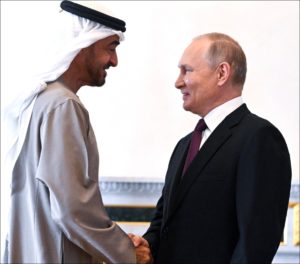
As the Middle East Institute points out, the Gulf states are often overlooked in their benefitting from Russia’s energy war with Europe. It’s a war that predated, of course, Russia’s invasion of Ukraine in a war Putin clearly expected to be brief and victorious. It has proved to be neither. But these sorts of commercial conflicts are seldom without the opportunity for profit for those willing to take a (very small) risk. Some Gulf states have engaged in arbitrage, substituting cheap Russian fuel oil for the home-produced variety in their power plants, thus freeing up more of their own oil to export to clients in Europe who are trying to reduce their dependence on Russian oil in any form. This is normally done by Kuwait and Saudi Arabia and it’s very big business. A study conducted in October 2022 revealed that a large increase in fuel oil consumption throughout the summer of 2022 did not bring about a fall in oil exports because of the vast volume of Russian oil that was being imported and used for energy generation to replace the domestic product.
| MY PIGGY BANK IS TOO SMALL
Meanwhile, Russian buyers are pushing up the price of real estate in the UAE, spending more than the locals can afford while rents are soaring It seems that 72% of Russian ex-pats say they’ve bought property there during the last year. Property is always a good investment, it seems, and Russian ex-pats are increasingly choosing to settle in the Gulf. They’re spending more, too: while most locally-based purchasers spend an average of $0.6-million (€0.57-million) on a property, Russians are spending an average of $1.1-million (€1.04-million). Apparently they also prefer villas, rather than apartments, with 67% of Russian ex-pats saying they’ve bought villas there. For them, the UAE offers a stable economy and political system, so it offers the super-rich a useful and luxurious safe haven, away from regions engaged in conflict, according to Akshay Jayaprakasan, a partner in Redseer property. After all, Russian citizens face sanctions in most Western countries. Oligarchs prefer places that are still open for business, but local property experts still think the Russian-fuelled boom will be short lived, at least relatively speaking. It looks as if they’re buying second properties, too.
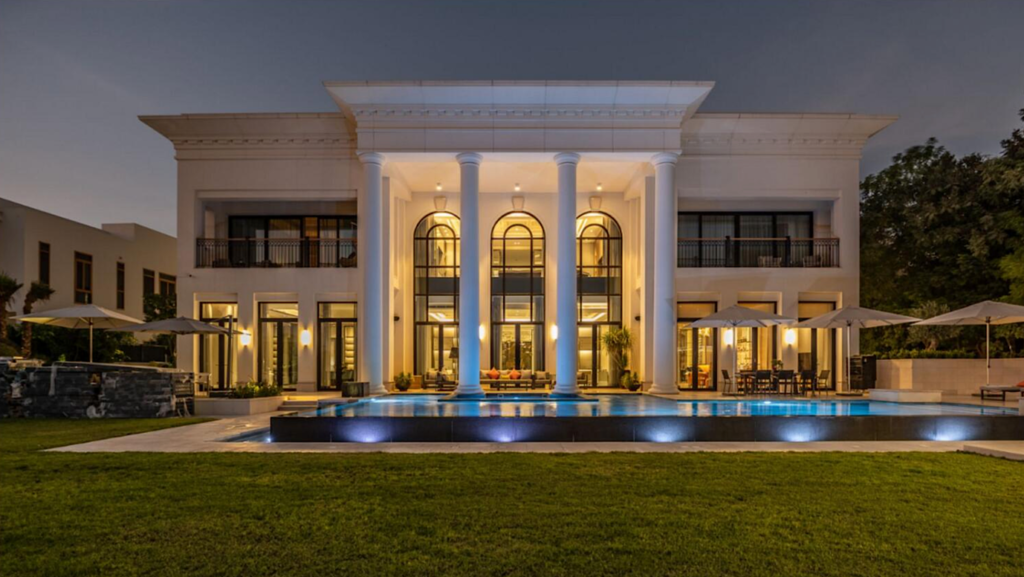
Research suggests that the average Russian buyer in the UAE is rich and looking to invest on a large scale. Russians spent – on average – 98% more on real estate than other purchasers from elsewhere. As the BBC puts it, the UAE has not put sanctions on Russia nor criticised its invasion of Ukraine. The BBC also mentions how the Gulf state is providing visas to non-sanctioned Russians while many Western countries have restricted them. There is an old English (or possibly American) saying, “home is where the heart is”, but in the case of wealthy Russians fleeing Western sanctions, home is more likely to be where they stashed the loot. It’s a good bet to suggest that means the UAE.
The West is becoming ever-more dangerous. For instance, in March 2022 Spanish officials impounded an 85-metre yacht belonging to a Russian oligarch while it was moored in the port of Barcelona. That is why, it seems, that Virtuzone, a company that helps companies to set up operations in Dubai has seen its numbers of Russian clients skyrocket. The firm’s chief executive, George Hojeige said the numbers of inquiries have surged to five times their previous level since Putin invaded Ukraine. “They are worried about an economic meltdown that’s coming,” said Hojeige, “That is why they’re moving here to secure their wealth.” Several of the real estate firms in the UAE have been obliged to take on Russian-speaking agents to deal with all the enquiries from Russians wanting to move without delay. “Russians who are coming down are not buying just for investment,” he said, “they are looking at Dubai as a second home.”

Several firms with bases in either Russia or Ukraine are relocating their operations to the UAE, which must be good news for the Gulf state. Several firms report having to move hundreds of their employees. “The war had a massive impact on our operations,” said Fuad Fatullaev, co-founded of the blockchain technology company WeWay, which had offices in both Russia and Ukraine, “We couldn’t continue (as we were) as we had to move hundreds of people outside of Ukraine and Russia.” Fatullaev is a Russian citizen, by the way. But the UAE has played it safe with Putin’s regime for a long time. It was one of only three countries, along with China and India, to abstain in a United Nations Security Council vote condemning Russia’s invasion of Ukraine. It also abstained in a UN General Assembly vote in April 2023 to suspend Russia from the UN Human Rights Council. Putin knows who his friends are! As The Economic Times, an Indian publication, reports: “Russian banks, including VTB, Sberbank, and Gazprombank, are considering becoming foreign portfolio investors (FPIs) to trade on Indian stock exchanges. VTB, Russia’s second largest bank, has approached the Securities and Exchange Board of India (Sebi) to obtain an FPI license. The proposal will also need approval from the Reserve Bank of India (RBI).” Russia is India’s biggest trading partner in the CIS Region, and its fifth largest trading partner globally (up 25 places from last year). It’s a very old friendship, dating back more than seventy years; not only does Russia hold a prominent place among India’s Foreign Direct Investment portfolio but it has also helped India to grow in a number of sectors, including defence, finance, politics and science and technology. Since Christmas 2015, they have been joint signatories of a protocol that sets a target of US$30-billion (€28.38-billion) in trade by 2025.
| HERE’S SOME OIL; BE MY FRIEND
Moscow has also been urging the Indian government to invest in Russia’s sanction-hit oil and gas industry. It’s keen to expand Russian sales networks in what is Asia’s third largest economy. Russia’s economy is facing its deepest crisis since the collapse of the Soviet Union in 1991.
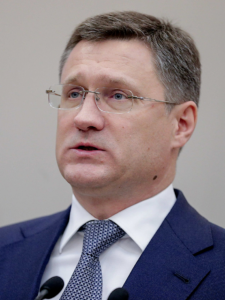
India has resisted the urgings of its western allies to condemn Russia for its aggression in Ukraine, while Russia’s Deputy Prime Minister, Alexander Novak, claimed that his country’s oil and petroleum products sales to India have almost reached $1-billion (€0.94-billion). “We are interested,” he said, “in further attracting Indian investment to the Russian oil and gas sector and expanding Russian companies’ sales networks in India.” Putin’s interest in Ukraine is based on his strange belief that they are really one and the same country. In July 2021, he published a second of his articles on “history” (for which please read “fanciful fiction”), this one entitled “On the Historical Unity of Russians and Ukrainians”, this time to help prepare his own people for the coming war. The text itself was the work of Vladimir Medinsky, a professional publicist and a former minister of culture who has served as Putin’s court historian. He writes what Putin wants people to read, not the historical truth. Medinsky disregards all the unpleasant facts of Russian history as “myths and slanders”, invented by the West. In his brilliant new book, War and Punishment, Russian journalist Mikhail Zygar points out how – in his view, if nobody else’s – Tsar Ivan the Terrible was really quite a nice chap and not a bloodthirsty tyrant, while all the gory details of his blood-soaked reign are, as he puts it, “Russophobic fiction”.
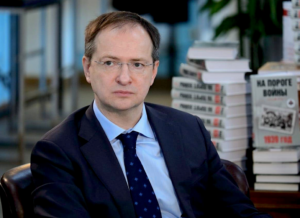
Putin’s article on Ukraine is in similar vein. He has instructed Medinsky to show that Russians and Ukrainians are one people, although he offers no proof or any kind of evidence to back up his claim. Among the wilder claims are one that Ukraine’s border was created by Lenin, that Ukrainian nationalism was the invention of Austria-Hungary, that the Soviet Union never infringed the rights of Ukrainians (not many Ukrainians would share that view) and that Ukraine has been turned into “anti-Russia” by the Americans. When I was in Kyiv several years ago, the only American thing I saw was local Ukrainians dressed as Disney characters. I recall one young lady crossing a large square dressed up as Minnie Mouse, which I don’t think counts as “anti-Russian”. Nationalist uprisings in Ukraine and the Caucasus were brutally suppressed by the Tsar, although, writing in Novaya Zhizn in 1905, Vladimir Ilyich Lenin pointed out that “Tsarism is no longer able to suppress the Revolution; the Revolution is still unable to destroy Tsarism.” That was the same year Lenin met Stalin for the first time. They attended the First All Russian Bolshevik Conference together in the Finnish city of Tammerfors (Tampere). It was later, in 1917, that plans were laid to drive the Germans and Austrians out of Ukraine, which they had occupied for two years. The first attempt failed. Lenin, of course, did not give up: he wanted to see a free Ukraine, which Putin, it seems, does not. Certainly when I was in Kyiv several years ago the anti-Russian sentiment was palpable.
Russia is hardly likely to be improving its network of “friends” with its temporary ban on exports of oil-related products to all but four of the former Soviet states. This comes on top of Western sanctions on Russian fuel exports. Experts say that importers will have to seek out alternative sources. As if that wasn’t enough, Russian oil producers have also been hit by the rising cost of maintenance at its oil refineries, bottleneck on its railways and a weak rouble . The last thing Putin needs right now, with a Presidential election looming next March, is an avoidable fuel crisis.

Meanwhile, the Gulf states are looking increasingly self-confident. With Russia out of the running, the West is increasingly dependent on Saudi Arabia, Qatar, the UAE and Kuwait for its supplies of oil and natural gas. That, in turn, gives greater power to the Gulf Cooperation Council (GCC), which also includes Oman and Bahrain. Incidentally, the GCC has remained neutral on Russia’s assault on Ukraine , refusing to join in with sanctions. And, as Bloomberg points out, there’s more to the story: “Thanks in part to the historically high crude prices OPEC engineered in the 15 months since Russia launched its war, the region is not only swimming in petrodollars but increasingly has become the marginal supplier of investment capital to the world.” There are a lot of happy faces around the boardroom tables of the Gulf states. “Together, the Abu Dhabi Investment Authority, the Kuwait Investment Authority, the Saudi Public Investment Fund and the Qatar Investment Authority now manage almost $3-trillion (€2.84-trillion), up 42% in the past two years, according to Global SWF.” You would need a very large piggy bank to hold all that.
| HEALTHY OR NOT?
But on the surface, at least, the Russian oil and gas industry looks very healthy. The revenues from them increased by 15% from August to an impressive $7.4-billion (which is 73.9-billion roubles or €7-billion) during September because of higher-than-expected budget proceeds from both extraction tax and export duties, according to Russia’s Finance Ministry. From January to September, on the other hand, Russia’s oil and gas revenues fell by 34.5% year-on-year to $56-billion (just under €53-billion). That’s still a lot of money. However, there was a decline due to lower natural gas sales with most of Europe cut off from Russian gas, price caps on Russian crude, discounts at which Russia’s oil is being sold to Asian buyers, and the lower international oil prices so far this year compared to last year’s highs (when prices hit $100 per barrel following the Russian invasion of Ukraine), the average price of Russia’s flagship crude grade, Urals, averaged $83.08 (€78.59)per barrel in September, higher than the average of $68.25 (€64.56) a barrel in September 2022, according to the finance ministry. However, as Reuters reports, “The Russian state’s oil and gas revenues rose by around 15% in September, month-on-month, to $7.44 billion or €7.33-billion, according to recent finance ministry data, thanks to a rise in proceeds from the mineral extraction tax. Every cloud, so they say, has a (literally) silver lining.

The Dubai-based lifestyle magazine Russian Emirates publishes a selection of the sorts of questions that it most often gets asked. According to Deutsche Welle (DW) these include things like where one can find Russian food, where one can find Russian-speaking doctors and the most popular one of all: can I obtain UAE citizenship? That one got 83,000 views. The number of hits on the magazine’s website almost doubled once Russia had invaded Ukraine. Observers expect that trend to continue as Russians seek ways to avoid sanctions and look for ways to escape the political situation at home. There have also been reports of private jets, belonging to Russian oligarchs, flying frequently between Moscow and Dubai, the suspicion being that they’re being used to ferry private property out of Russia. Other investigators have noted several “superyachts” moored in Dubai but registered in Russia. It’s one place, the owners seem to believe, where their maritime wealth won’t get seized.
DW also reports that: “There is increasing concern that Dubai will indeed become an even greater hub for Russian oligarchs’ money,” Jodi Vittori, a professor at Georgetown University in Washington and expert on corruption, illicit finance and state fragility, confirmed. Perhaps that’s the downside of being an energy billionaire: the authorities will keep trying to arrest your yacht. We’re unlikely ever to know the extent of the dirty money flowing through Dubai, however, because the UAE authorities don’t keep records. Dubai is now being monitored, however, by organisations like the Financial Action Task Force (FATF), a money laundering watchdog that is increasingly suspicious of the UAE and the possibly shady goings on there. It’s not easy to keep pace: the UAE has 39 different company registries across its seven emirates. DW reports that there are also more than 40 of what are known as “free zones” in the UAE, mostly in Dubai, where foreigners can locate (or relocate) companies. Sounds like manner from heaven for dubious Russian crooks.
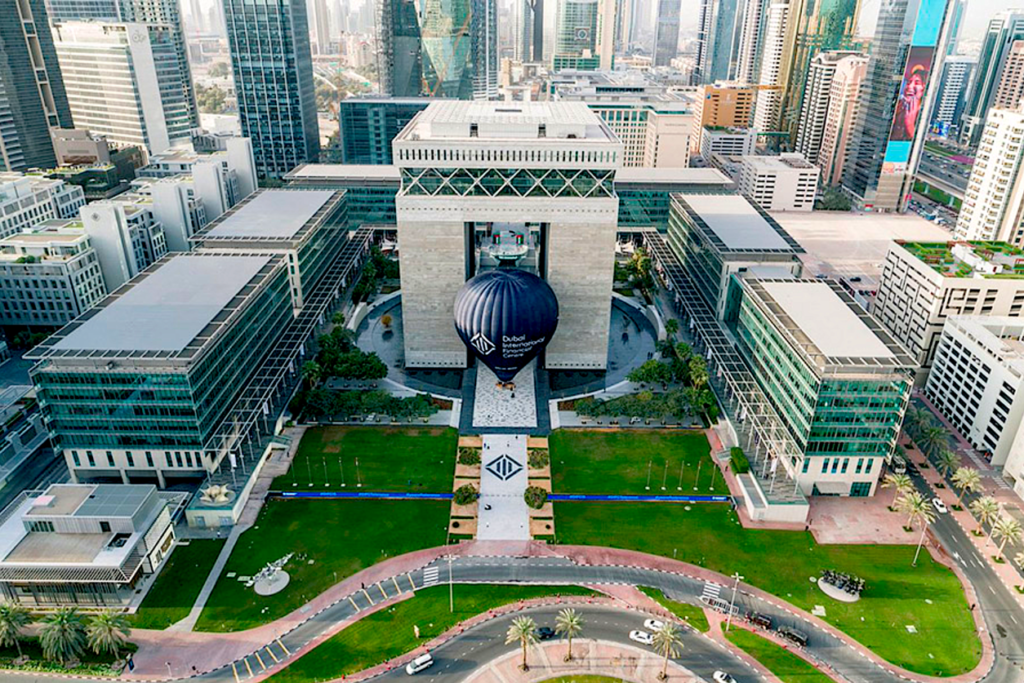
DW reports how easy it is for foreigners to set up shop in the UAE. Buying property there is easy and paperwork is minimal, especially for those with cash. It’s strange how we, in this age of electronic payments, still feel happier with cash. If you buy any real estate worth around €185,000, you get a 3-year visa, while investing €1,18-million turns it into a 5-year visa, which makes it a tempting destination for Russians keen to avoid losing their investment to the Russian state. Few ever bother to register their UAE properties back at home. Apparently, the UAE is not alone in providing hidden cash boxes to foreigners. A number of possible hiding places for ill-gotten gains (and even for honestly-obtained gains) include Pakistan, South Sudan, the Cayman Islands, Yemen, Morocco and various others. One might have thought that at least some of these investors may have viewed the interest paid as “haram”, to be avoided as “forbidden”, and, of course, “sinful”.
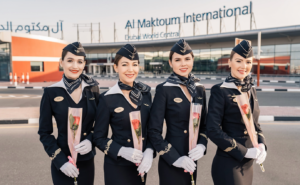
Even so, rich Russians are trying to shift a large proportion of their wealth from Europe to Dubai and other Gulf states to shield it from a tightening wave of Western sanctions on Russia over its invasion of Ukraine, according to financial and legal sources. Dubai has long been a magnet for the globe’s ultra-rich and this became even more important after the UAE’s refusal to take sides between Western allies and Moscow. Dubai has let Russians know that their money is safe there, and the knowledge has turned this Gulf state into the world’s biggest moneybox. I began this article with a quotation from the Quran, so I might as well end with one, too. This one comes from the opening lines od The Believers: “Prosperous are the believers, who in their prayers are humble and from idle talk turn away and at almsgiving are active and guard their private parts save from their wives and what their right hands own then being not blameworthy (but whomsoever seeks after more than that, those are the transgressors).” The verse goes on, but you’ve got the gist of it there. How many oligarchs, I wonder, can say – hand on heart – that they follow these instructions faithfully. I fear that doing so is not a condition for investing in the Islamic state of the United Arab Emirates. Tut, tut….

